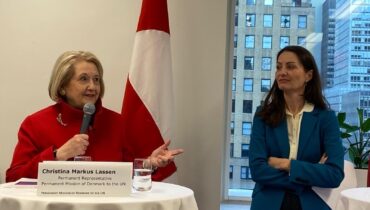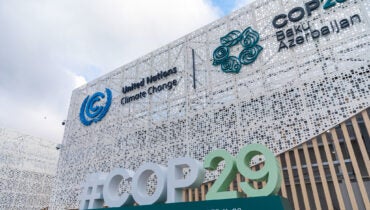GIWPS hosted a conversation on integrating women’s participation into climate change adaptation on February 26 in conjunction with the Taipei Economic and Cultural Representative Office.
Issues of climate change and natural disasters are of utmost importance to Dr. Minerva Pinelo from Belize’s Community Preparedness and Resilience Project. As a coastal nation, her home country of Belize is incredibly vulnerable to hurricanes, tropical storms, and flooding. Now faced with intensified threats from climate change, Dr. Pinelo declared, “This is a whole new ballgame for us.”
As panelists shared their expertise and experience, a common theme emerged: Resilience. Vulnerable communities must be well-prepared and well-equipped for crises. Efforts to respond and recover after natural disasters strike are not enough – especially for impoverished, marginalized communities who suffer the greatest devastation. Katie Taylor of the Pan-American Development Foundation (PADF) voiced poignantly:
“Think about resilience, and then think about living on $3 a day; God forbid there’s a crisis of some kind.” Taylor affirmed with conviction, “Every life matters, so we must find solutions.”
In finding these solutions, women are innovative agents of change. Deeply committed to their families and neighborhoods, women know the needs and invest in their communities. Taylor pointed to the evidence: “Studies show that for every $1, women spend $0.90 on their family.”
The World Bank’s Margaret Arnold referenced countless testimonies from the Bank that illustrate the ripple effect of women’s empowerment. Rather than migrating, women learn to adapt to their environment. Naturally, women are ideally positioned to form effective adaptation methods that transform their communities.
Yet women often lack the basic tools and resources to confront disasters – especially in countries with large gender gaps. For example: women who lack a right to own land cannot have their homes rebuilt by NGOs because they have no paperwork to prove their residency. The need to partner with women is critical. Lorena Aguilar from the International Union for Conservation of Nature (IUCN) stated plainly:
“We need to be gender responsive, not just gender sensitive…Do something to close that gap.”
The road to inclusive, sustainable action can be a struggle. Margaret Arnold admitted: “I’ve been at the World Bank for 23 years, and I’m tired of fighting the same fight. We have made progress, but we are still trying to engineer our way out of climate change.” Nevertheless, the panel, moderated by GIWPS executive director Ambassador Melanne Verveer, offered hope:
At the local level, Dr. Pinelo has empowered 14,000 beneficiaries in Garifuna communities to build capacity, plan for disasters, and restore their forests. At the national level, Bangladesh has reduced its women-to-men ratio of cyclone deaths from 14:1 to 5:1 though gender awareness, said Arnold. At the global level, the 2017 United Nations Climate Change Conference (COP23) adopted the first international Gender Action Plan for climate policy, said Aguilar. Deputy Representative of the Taipei Economic and Cultural Representative Office, Ms. Christine Hsueh, spoke about the importance of sharing these solutions and welcomed inclusive collaboration among countries as vital to effective disaster risk reduction.
Moving forward, the consensus was to think bigger together. Aguilar insisted:
“Climate change gives you an incredible opportunity because you’re bringing new things to a community… Use what climate change is bringing and think outside the box.”
Innovative adaptations to climate change are an opportunity to be ground-breaking – to trailblaze our way to inclusive resiliency.
Kayla Elson is M.A. Candidate at Georgetown’s Conflict Resolution program. She also serves as a research assistant for Georgetown’s Institute for Women, Peace, and Security.


